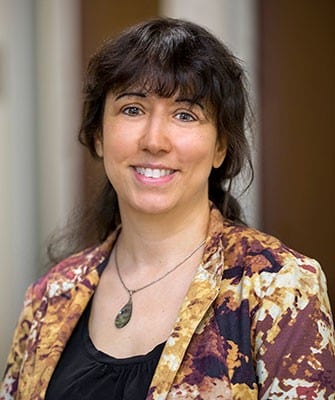What does preparing students to be ethical nurses equipped to enter the workforce with the skills they need to use new technologies to promote excellent patient care look like?
When Assistant Professor of the Practice in the Connell School of Nursing, Beth McNutt-Clarke, joined the AI Working Group, the educational mission of the Connell School of Nursing “to prepare compassionate, professional, competent nurses” who work for the “promotion of social justice” was at the forefront of her mind.

As the clinical coordinator for the capstone course, Nursing Synthesis Clinical Laboratory, Prof. McNutt-Clarke wanted to think through how she might creatively use GenAI in her course to not only better prepare students for their licensing exam, the National Council Licensure Examination (NCLEX), but to better facilitate the goal of the capstone course itself– to synthesize all of their learning in the program and apply it to the work of nursing.
To do this, Prof. McNutt-Clarke asked students to use ChatGPT to generate patient care plans and then analyze those care plans in light of nursing best practices. “GenAI is a powerful tool that helps organize and suggest comprehensive care plans from vast databases,” explained Beth. However, she stresses that the real educational value lies in student nurses learning to evaluate these suggestions critically. “It’s vital for our future nurses to discern what is applicable from the AI-generated data and what might be irrelevant or outdated, integrating this technology with their human judgment and ethical considerations.”
One of the places where GenAI falls short is one of the biggest strengths of Boston College’s Nursing Program– equipping students with the cultural competencies and ethical decision-making frameworks to provide truly excellent patient care. While ChatGPT’s care plans were often sound, they also tended to be generic and similar to what one might find in a textbook. They “did not consider the psychosocial aspects of patient care that often impact the clinician’s ability to perform the proposed interventions,” Prof. McNutt-Clarke shared.
In nursing, small mistakes or inaccuracies can have huge consequences. “In nursing, the stakes are incredibly high. People’s lives can be impacted by the decisions we make, so it’s crucial that we use AI responsibly and always in conjunction with our clinical judgment,” McNutt-Clarke noted.
Reflecting on this project, Prof. McNutt-Clarke highlighted that overall, student feedback was positive. At the same time, students became even more aware of the necessity of using technologies like GenAI in concert with rigorous clinical judgment. This is even more crucial given the nursing shortage that was further exacerbated by the COVID-19 pandemic when many seasoned nurses left the profession. “You have a lot of younger nurses that need something to help them,” Prof. McNutt-Clarke stated. “AI can be used as a resource to make care better and safer, enhancing nurses’ clinical judgment.”
It’s not a question of whether the medical field will incorporate GenAI; it already has. Prof. McNutt-Clarke sees her role as a nursing educator as one where she can “help students reach the next level and prepare them to be safe, competent, culturally competent practitioners.” This requires exposing students to many different tools they can use to improve patient care, including GenAI.
